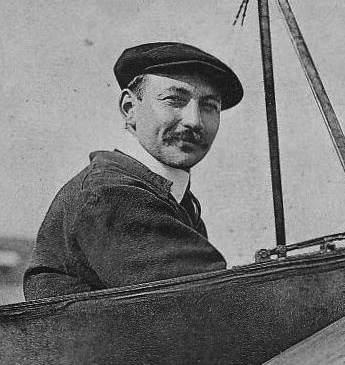1881-1952 (French Pilot's Licence No. 25)



Léon Molon was born on January 12th, 1881 in Arras in
northern France. From early on he was interested in mechanical things
and he raced bicycles in his youth. His family was wealthy, his parents
owned a shoe factory, and already when he was fourteen they bought a
Bollée automobile for him. He started racing cars in 1902 and
participated in several races for different makes. In 1904 he started a
successful automobile dealership and garage in Le Havre, selling and
repairing Renault and Vinot-Déguignand cars.
During business visits to Paris Molon got to know many of the famous
early aviation personalities at the airfield of Issy-les-Moulineaux,
among them Louis Blériot and the Voisin brothers. His mechanical
expertise was appreciated by the aviators, who often sought his help.
During 1909 he helped in the construction of the Charles Wilkes
biplane, which finally made a couple of short flights outside Le Havre.
After Blériot's channel crossing Molon decided that he wanted to
become a pilot and he became the first to order one of the new Blériot
XIs. He took delivery of it on September 21st, and after learning to
fly it he was engaged by Blériot for the upcoming Berlin meeting. He
participated in several more meetings, beginning with those of
Doncaster, Antwerp and Cannes. He was one of the most active pilots
during late 1909 and early 1910, but he was always handicapped by the
weak, vibrating and unreliable Anzani engines of his Blériots and never
achieving any great results. His last competitive meeting was his home
meeting of Baie de Seine, at Le Havre and Deauville, but he continued
to fly his own and others' planes in parallel with automobile
racing.
During World War 1 he served as flight instructor at Caudron. After the
war, in 1919, he relaunched the Aero Club of Le Havre and served as its
president for eleven years. He continued to fly light planes for
pleasure all his life, owning a Farman F.402 and a Caudron C.510
Pelican. He also continued with his automobile business and
participated in several races, for example twice in the 24 Hours of Le
Mans, the last time in 1926. In 1944 Molon's garage was heavily
damaged by the allied bombings of Le Havre. He passed away on July
26th, 1952.
Molon qualified for "French Brevet de Pilote" No. 25 on
January 6th, 1910.
Léon Molon participated in the following air race meetings:
- Berlin 1909
- Doncaster 1909
- Antwerp 1909
- Cannes 1910
- Tours 1910
- Lyon 1910
- Verona 1910
- Baie de Seine 1910
